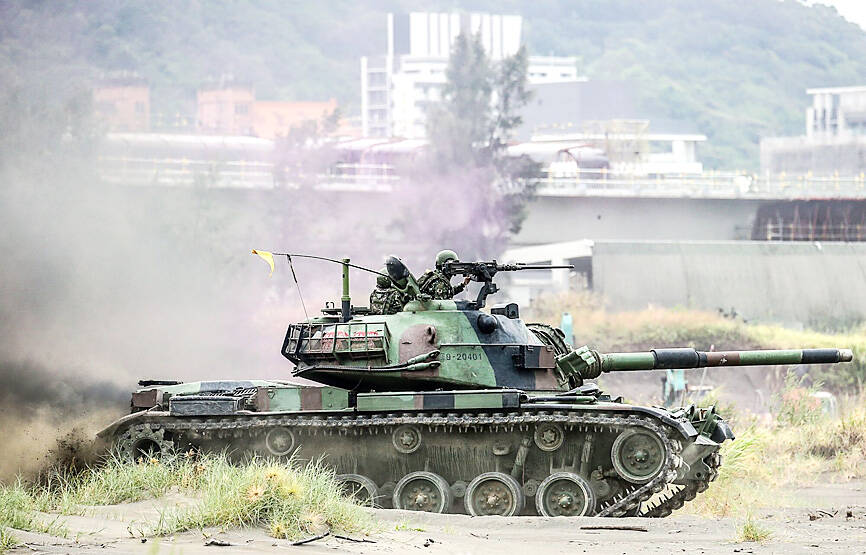The Executive Yuan has proposed NT$440 billion (US$14.02 billion) for defense spending next year, an increase of 7.5 percent from the previous year, a source said yesterday on condition of anonymity.
The figure includes an additional NT$30 billion — for purchasing M142 High Mobility Artillery Rocket Systems and M1A2T Abrams tanks, among other items — on top of policy-mandated defense spending of NT$400 billion, the source said.
The policy requires that annual defense spending not be lower than the average economic growth rate over the past three years.

Photo: I-hwa Cheng, Bloomberg
Adding the NT$49.27 billion in special budget funding for a program to enhance military capabilities, as well as NT$45.20 billion for acquiring new jets, to the total proposed budget expenditure, brings next year’s proposed military budget to NT$534.5 billion, a record high, the source said.
The Executive Yuan is expected to deliver its final version of the budget to President Tsai Ing-wen (蔡英文) early next month.
Tsai, who has been placing great emphasis on national defense spending, is expected to instruct the Cabinet to increase the budget, the source said.
The Executive Yuan is slated to pass a final version on Aug. 24 before forwarding it to the Legislative Yuan for approval, they added.
The source said that the nation’s total income for next year is expected to reach a record NT$2.7 trillion, growing 4.7 percent from this year, with tax revenue of NT$2.2 trillion.
Expenditures are expected to reach a record NT$2.88 trillion, up 6.7 percent from this year, they said.
Taiwan would run a deficit of NT$170 billion, they added.
The source said that the social welfare budget would likely increase 10 percent, or NT$77 billion, from last year’s NT$707.3 billion to NT$790 billion.
The majority of the funding, about NT$64.5 billion, would go toward the Laborer Insurance Fund, while NT$12.5 billion would go to a state subsidy program to help parents with newborns and children up to age 6.
The National Development Council asked for NT$207.3 billion and the National Science and Technology Council asked for NT$143.8 billion, while the Executive Yuan is considering increasing both agencies’ allotted funding by 10 percent over last year, the source said.
Most technology expenditures, an estimated NT$150 billion, would be used on developing zero emissions technologies for aerospace and next-generation communications networks, they said.
About NT$265 billion has been allocated for infrastructure, including NT$180 billion for construction projects and a special budget for the Forward-looking Infrastructure Development Program.

A Chinese aircraft carrier group entered Japan’s economic waters over the weekend, before exiting to conduct drills involving fighter jets, the Japanese Ministry of Defense said yesterday. The Liaoning aircraft carrier, two missile destroyers and one fast combat supply ship sailed about 300km southwest of Japan’s easternmost island of Minamitori on Saturday, a ministry statement said. It was the first time a Chinese aircraft carrier had entered that part of Japan’s exclusive economic zone (EEZ), a ministry spokesman said. “We think the Chinese military is trying to improve its operational capability and ability to conduct operations in distant areas,” the spokesman said. China’s growing

Nine retired generals from Taiwan, Japan and the US have been invited to participate in a tabletop exercise hosted by the Taipei School of Economics and Political Science Foundation tomorrow and Wednesday that simulates a potential Chinese invasion of Taiwan in 2030, the foundation said yesterday. The five retired Taiwanese generals would include retired admiral Lee Hsi-min (李喜明), joined by retired US Navy admiral Michael Mullen and former chief of staff of the Japan Self-Defense Forces general Shigeru Iwasaki, it said. The simulation aims to offer strategic insights into regional security and peace in the Taiwan Strait, it added. Foundation chair Huang Huang-hsiung

PUBLIC WARNING: The two students had been tricked into going to Hong Kong for a ‘high-paying’ job, which sent them to a scam center in Cambodia Police warned the public not to trust job advertisements touting high pay abroad following the return of two college students over the weekend who had been trafficked and forced to work at a cyberscam center in Cambodia. The two victims, surnamed Lee (李), 18, and Lin (林), 19, were interviewed by police after landing in Taiwan on Saturday. Taichung’s Chingshui Police Precinct said in a statement yesterday that the two students are good friends, and Lin had suspended her studies after seeing the ad promising good pay to work in Hong Kong. Lee’s grandfather on Thursday reported to police that Lee had sent

BUILDUP: US General Dan Caine said Chinese military maneuvers are not routine exercises, but instead are ‘rehearsals for a forced unification’ with Taiwan China poses an increasingly aggressive threat to the US and deterring Beijing is the Pentagon’s top regional priority amid its rapid military buildup and invasion drills near Taiwan, US Secretary of Defense Pete Hegseth said on Tuesday. “Our pacing threat is communist China,” Hegseth told the US House of Representatives Appropriations Subcommittee on Defense during an oversight hearing with US General Dan Caine, chairman of the Joint Chiefs of Staff. “Beijing is preparing for war in the Indo-Pacific as part of its broader strategy to dominate that region and then the world,” Hegseth said, adding that if it succeeds, it could derail